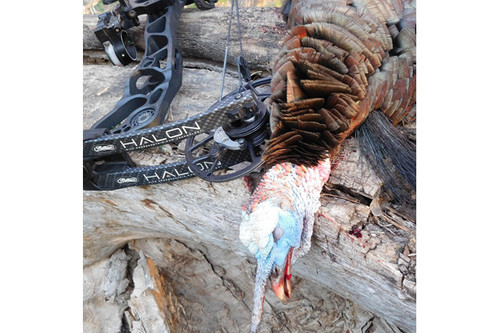Backcountry Longbeards
Published on Nov 18th 2021 by Tracy Breen
Spring is right around the corner. It won’t be long before hunters everywhere will be standing in the woods before dawn listening for lovesick longbeards. The problem with turkey hunting is that in many states, including my state of Michigan, you can only kill one turkey during the spring season. When I fill my Michigan tag, I often find myself longing for more time in the woods. To spend more time in the woods, I travel to other states and hunt. The cool thing about turkey hunting is it is relatively inexpensive. Nonresident tags in most states can be purchased over-the-counter and don’t cost an arm and a leg.
If you have never turkey hunted away from your home turf and are considering going on an out-of-state hunt, I suggest heading west and hunting the Merriams sub species in Colorado, Idaho or any of the other Western States that have a healthy population of turkeys.
I believe everyone should hunt turkeys out west because every hunter should experience hunting in the mountains. Many hunters dream of hunting big game out west, but the odds of success on elk or mule deer is often limited and the cost of the hunt is often high. Turkey hunting, on the other hand, is inexpensive. The odds of success are extremely high and hunting in the mountains is fun.
The West is full of large sections of public land that makes hunting turkeys on a budget easy. Hunters can stay in a nearby hotel or stay in a tent in the backcountry. My favorite way to hunt out west is by staying in a tent in the wilderness. It is fun and staying in a tent is much cheaper than staying in a hotel.
When hunting turkeys out west, especially in areas where there isn’t much water, try to find a water source: a spring, a stream, or small pond. Everything needs water and all wild game typically live near some type of water source. I have had my greatest success locating birds by locating a water source and good roosting trees. Finding birds on public land can be tough, but it isn’t impossible. The goal is to spend a fair amount of time at day break hiking and listening for gobbles as the sun comes up. Once you locate birds, move in and call.
It is important to note that because the public land in the West is so vast, you may have to hike a mile or more when you locate a flock of birds. The good news is unlike pressured Eastern birds, Western birds that live in the backcountry don’t often get hunted much and can be called in easier than birds that receive a lot of hunting pressure.
Hunters who have the most success chasing public land birds in the West often hunt them the same way they hunt elk. They try to locate birds by walking and calling. In some cases, they may walk several miles a day or more in search of a hot gobbler. Once they get a bird to respond to their calling, they cut the distance between themselves and the bird as much as possible and call aggressively.
Running and gunning on logging roads can make locating birds easier than hiking in the backcountry on foot. More hunters are using mountain bikes and electric bikes to cover distance quickly when searching for birds.
When hunting in the backcountry for longbeards, you will need the same gear you need for a backcountry elk hunt. A good tent, backpack, and clothing that can handle the cool spring temperatures often found in the mountains. Snow is not out of the question. The coldest turkey hunt I have ever been on was in the mountains of New Mexico. I was hunting the second week of April and the thermometer read -5 one morning. I had on every layer of hunting clothes I owned!
When hunting in the West, make sure you hunt near a fresh water source or pack in enough water to last the duration of your hunt. A water filter is a necessity. Water is often scarce in the backcountry. Running out of water will quickly end a hunt. When I hunt in the backcountry, I often bring a hydration powder called Hydrate & Recover with me. This product is made by Wilderness Athlete. When mixed with water, the drink helps keep me hydrated which is necessary in the backcountry.
The more time you spend in the backcountry, the better your odds of success will be. That said, staying any longer than four or five days can be difficult unless you make several trips to your campsite with food and water. In the past, we have used ATV’s and horses to get gear in and out of the backcountry.
When planning a backcountry trip, don’t be afraid to call wildlife biologists in the area you plan to hunt in. Turkeys are not as sought after like big game animals are. Biologists spend a lot of time in the wilderness and often know the general areas where turkeys live and will share this information with you.
It is hard to beat waking up before dawn and standing on a mountainside listening for gobblers. If you have never hunted turkeys in the mountains, you need to add it to your bucket list. The good news is it can be done on a budget and your odds of coming home with a bird is extremely high. This spring, pack your tent, some freeze dried food, your turkey calls and head west!